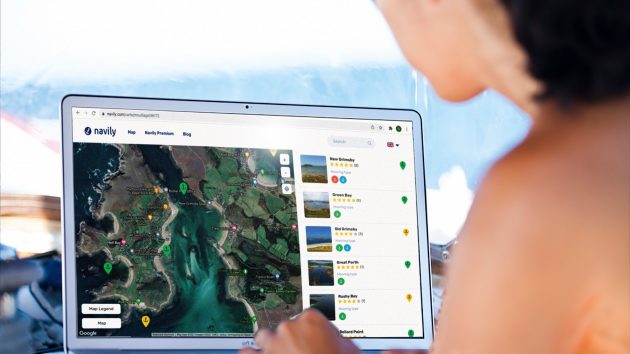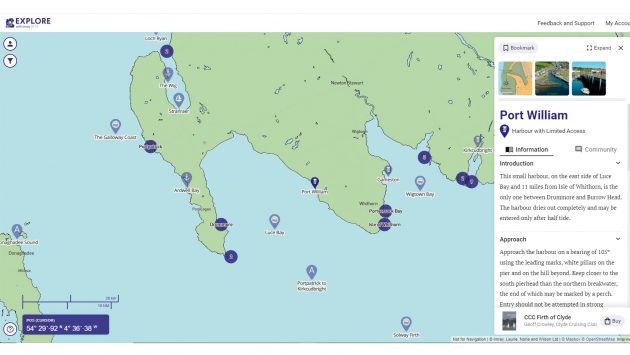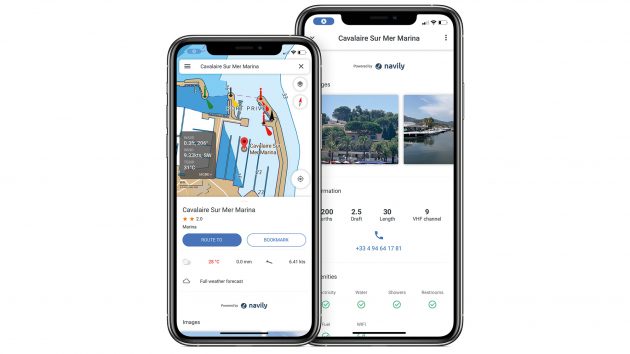Sam Fortescue takes a look at some of the most popular user-generated navigation guides for boaters, which are fast replacing the traditional pilot guide book
Pilot books used to be how we explored new destinations. Cruisers and charter sailors alike will have spent many hours poring over sketch maps and grainy photos in a hardback book that may not have been updated for many moons to identify where might offer good holding, a mini-mart, or a worthy snorkelling spot.
Nowadays we’re all used to having information at our fingertips, literally, through a smartphone. Naturally, a crop of boating apps and websites have developed to service the appetite for good quality information about sailing locations.
Cruising social media groups are bursting with personal recommendations or impressions, but this information is often uncategorised or hard to verify. Now, a number of more ‘official’ online sites and apps have been launched that combine user-generated up to date information with the backing of a reputable organisation or publisher.
Explore with Imray
It has long been a complaint in my family that pilot guides contain little useful information on the reasons to visit a specific harbour or anchorage. There is plenty on getting there safely and confidently, but precious little about the best pub, or the walk with views to die for. Well, no longer.
Nautical publisher Imray has launched an all-new app which aims to combine the best of both worlds. Explore with Imray is a blend of the critical navigational information associated with some 6,000 ports or anchorages, and the photos and posts of sailors who have been there.
In a way, it’s nothing new, according to Imray’s Lucy Wilson. “Crowdsourcing is what Imray has done for years and years – we’ve always been collecting this information,” she says. “We have about 100 books in our catalogue and we’ve only digitised 12 so far. That’s taken three months, but it’ll definitely speed up now.”
She walks me through the beta version of the app, which runs on phones, tablets and computers. It’s a neat interface that uses a Google-style map showing clusters of pins to navigate to the port you want information on. As you zoom in, pins marking each entry disaggregate until you can click through to the data. It’s quite a treasure trove.
Each pane opens with a chartlet, an overview image of the location and a series of expandable titles such as ‘contact’, ‘facilities’ and ‘approach’. Frequently used ports or harbours can be bookmarked for quicker access.
“One of the key things in our data is all of the approach information – anyone can get the contact details and facilities,” says Wilson. “Getting you there safely – that is our key tool.”
In my book, this alone would be worth the £49.99 annual subscription cost (or £8.99 per month). As Wilson points out, the charge is similar to the cost of a single printed pilot guide, yet gives you access to every location on the system. “You’re not buying a book, you’re buying everything that we’ve digitised,” she says.
There is an additional dimension: click the ‘community’ tab and you can access reports that subscribers have made for that location, offering anything from opening times of the local fish and chip shop to a favourite beach. It’s moderated – usually by the authors of the pilot guide.
“The social layer allows you to create your own profile and make blog posts – it’s a sort of ‘tell your story’; a way of sharing memories,” says Wilson. “You can also follow other people.” It will soon be possible for subscribers to post comments on existing entries, and to add their own locations – a neap-tide reef anchorage, perhaps, or a place to land on a deserted islet.
An easy link on screen allows you to purchase the relevant pilot guide – Imray doesn’t want Explore with Imray to cannibalise book sales. For instance, you’ll need the paper version for the introductory information contained in each chapter. And there is not yet tidal data available via the app. Plus, the system currently requires a live internet connection to function.
“We’re thinking about the best way to provide offline capabilities next year – perhaps through the web app (Imray Navigator),” says Wilson. “It could be like Spotify and their albums. The subscription would give access to everything, but then you can download for offline use.”
Note: We may earn a commission when you buy through links on our site, at no extra cost to you. This doesn’t affect our editorial independence.
Captain’s Mate
Coming from the other end of the spectrum is a newly relaunched version of the Cruising Association’s popular Captain’s Mate app. This used to be entirely based around club members’ reports and, while this element remains the mainstay, there is now a more businesslike introduction to every location detailing all the key factual data.
Just as with the Imray product, you navigate using the map. The system is smart enough not to try downloading every pin simultaneously, which used to lead to long rendering times.
When you select your location, you are presented with a page giving an overview of factual information, including approach notes. Click on the ‘info’ tab and you can see detail on the facilities available – something you can also specify as search criteria, allowing you to identify the nearest port with fuel or fresh water, for instance.
“We’ve sucked out all the factual information from the reports,” says CA general manager Lucy Gray. “It changes from location to location.”
There is not yet any tidal information available, and the detailed chartlets contained in the revered Cruising Almanac are also absent. “We’ve left a lot of doors open for the next revision,” says Gray. “Tides might be included later on, and we’re thinking of adding charts.”
But it is the reports that members value most, and the reports are the key to the app, which also works on smartphones, tablets and computers. They appear under a third tab, and allow you to scroll back through in date order, adding comments as you please. Of course, the CA wants members to leave their own reports too, and this is very easily done by clicking on the ‘add further report’ button.
All posts are moderated by a group of 44 editors, and software automatically checks that any uploaded photos are free of copyright. “The images we ask for are things that would help your approach or entry, layout of the marina and also things of local interest,” says Gray.
Coverage is as global as the adventurous members of the CA themselves. “There are 20,000 member contributions and 6,500 locations,” says Gray. “Some 77 countries are covered, although we’re trying to populate more places in the Caribbean and America.”
Another nice touch is the ability to see other members who are close at hand. As long as your own device is set to ‘share location’, a little CA burgee on the map is positioned to show fellow club members. As anyone who has ever sailed into an unknown anchorage and been heartened to spot a familiar burgee can attest, this is a popular feature.
The new app is designed to handle the much larger amount of data being generated by members. In its first year, 2015, Captain’s Mate saw 600 reports filed. But just a year later, that had mushroomed to 10,000 reports. “It was a victim of its own success,” says Gray. “It wasn’t able to cope. Now it’s more user-friendly, members will use it more than they have been.”
The app is free to use for CA members, who pay from £137 per year to be part of the club.
Get it now from the Apple App store
Get it now from the Google Play store
Noonsite
From Spitzbergen to South Georgia, Sierra Leone to Tasmania, Noonsite publishes reports from the farthest-flung cruising grounds in the world. Owned and maintained by the World Cruising Club, which organises the ARC rallies, this is a well-used tool for bluewater cruisers.
Editor Sue Richards tells me there are more than 2,700 reports online, and thousands more comments posted by users. The content can now be browsed using a map view.
This is your first stop for information on entry formalities, main ports, costs and bureaucracy. User comments are pinned to the bottom of each page, providing key updates, notices to mariners or advice about who offers the best service. Reports, on the other hand, tend to be narrative, relating the story of a cruise or an incident.
A new membership model will be launched next year, with costs running at $2 or $6 per month. Free access will be limited to three country views per month, but the real spur will be the offline content available to members.
“We know that many of our worldwide users rely on Noonsite as a trusted source of information about the countries and ports they visit,” says Jeremy Wyatt, WCC director. “Now, as part of our new premium features, users can download formatted Noonsite pages, just like a pilot book, to keep and use locally.”
Navily
It may lack the global reach of Noonsite, but for advice about good local anchorages, the free-to-use Navily app is excellent. Coverage runs to 20,000 locations, mainly in Europe and the Caribbean, and comments provide advice on anchoring, walks, pubs and restaurants.
Navily is based around Google satellite mapping, providing custom location pins to denote anchorages, featured ports and marinas. There is a useful traffic light system assessing the quality of an anchorage, and users have uploaded thousands of photos.
A premium version costing €19.99 per year allows you to download regions for offline use. It also adds in 72-hour weather forecasts and distance measuring tools. The weather tool feeds into an algorithm which gives you a ‘protection score’ out of 100 for any chosen anchorage.
Get it now from the Apple App store
Get it now from the Google Play store
 If you enjoyed this….
If you enjoyed this….
Yachting World is the world’s leading magazine for bluewater cruisers and offshore sailors. Every month we have inspirational adventures and practical features to help you realise your sailing dreams.Build your knowledge with a subscription delivered to your door. See our latest offers and save at least 30% off the cover price.









